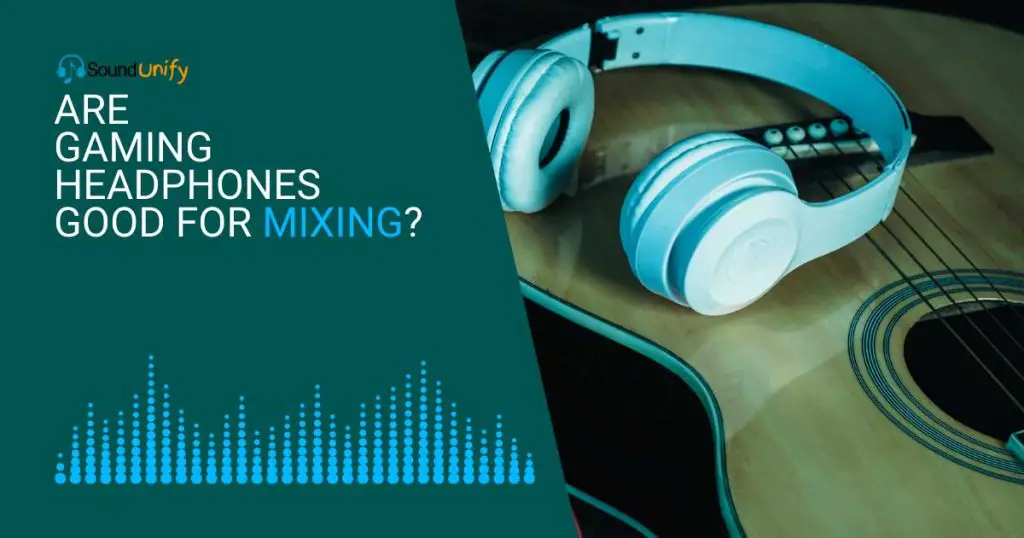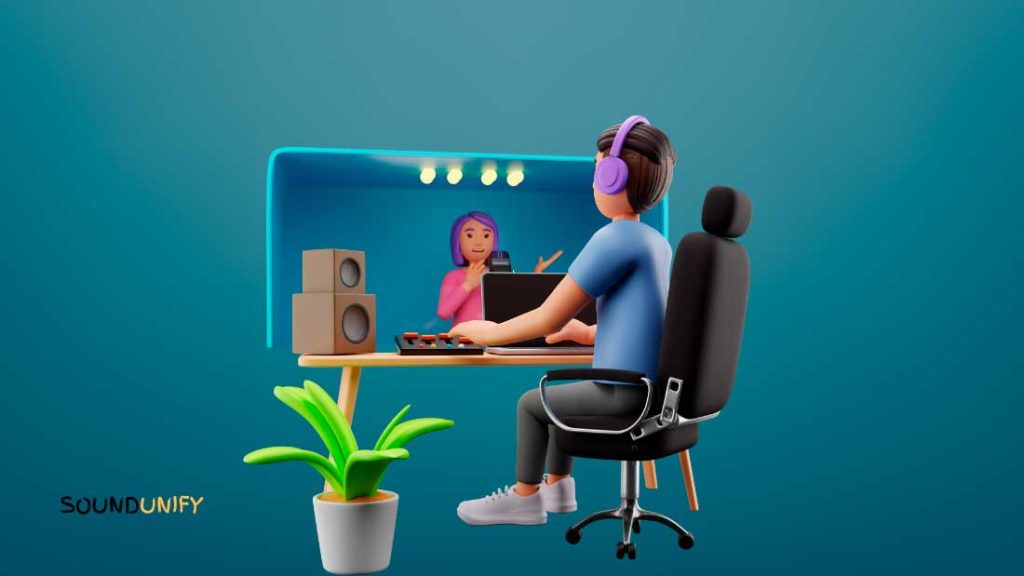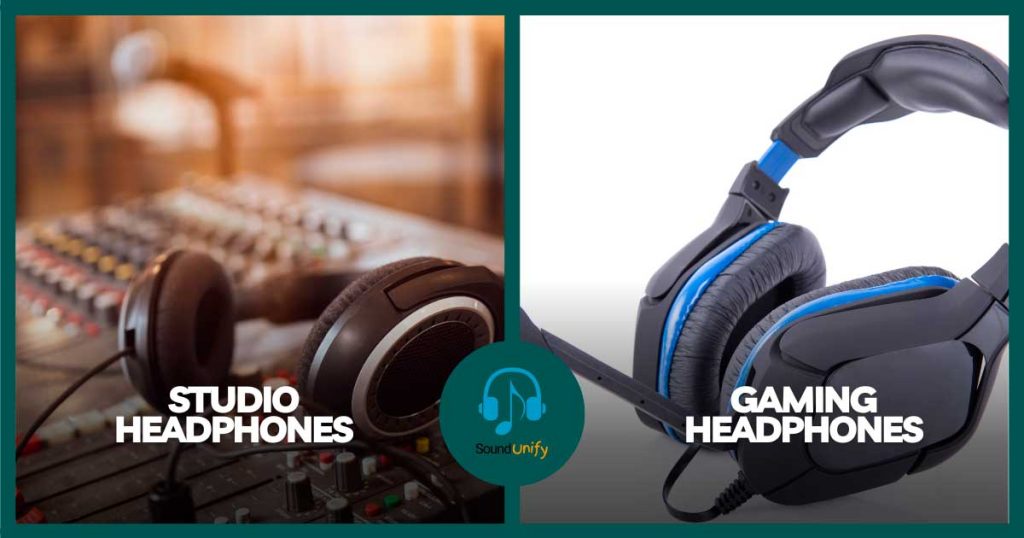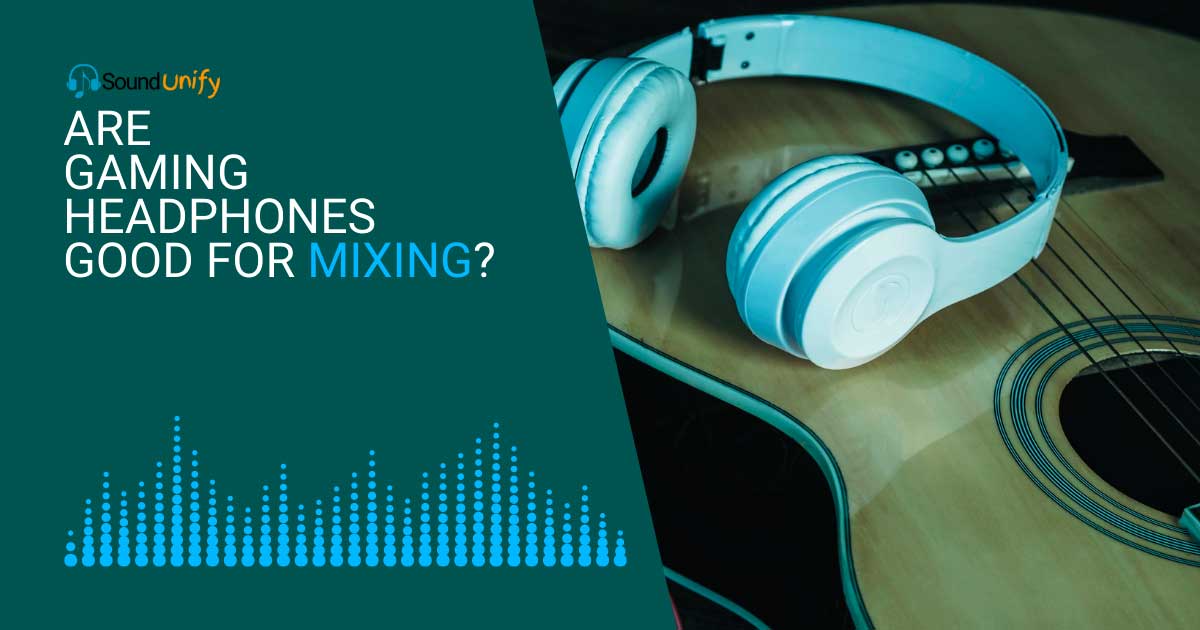For musicians who are serious about their craft, mixing is a crucial part of creating great music. Finding the right headphones for your mixing needs is essential for achieving the highest quality sound.
But what if you don’t want to spend hundreds of dollars on expensive studio headphones? Gaming headphones could be an option worth considering.
This blog post will explore, are gaming headphones good for mixing. When mixing, there are also Pros and Cons of using gaming headphones.
From sound quality to noise cancellation, we’ll look at how these headphones can help you create great music.
Are Gaming Headphones Good for Mixing?

Yes, for general and not for beginners and professionals. At the same time, gaming headphones may provide a different level of quality and accuracy than higher-end models. They can still be a viable option for those on a budget. But how good are gaming headphones for mixing?
Gaming headphones generally feature larger drivers than regular consumer models, making them better suited for low-end frequencies and bass response.
Many have also been designed with specialized features such as virtual surround sound or noise canceling. These features can help create more immersive audio experiences when mixing and mastering music.
Pros and Cons of Using Gaming Headphones for Mixing
Using gaming headphones for mixing is controversial among sound engineers and audio producers.
Some industry professionals insist that gaming headsets are not designed to produce accurate audio and should not use in the studio.
On the other hand, many music producers believe they can get great results with gaming headphones as long as they know what to look out for.
Regarding using gaming headphones for mixing must consider some pros and cons. Let’s talk about the pros:
- One of the main benefits of gaming headphones is their low cost and wide range of options available on the market.
- Gaming headsets also tend to have larger drivers than regular headphones, delivering bigger sound and better bass response. This helps create a more immersive experience when recording and mixing music.
- Gaming headphones are suitable for playing low-end frequencies, which can benefit EDM producers and other bass-heavy genres.
- Some gaming headphones also offer advanced features such as noise cancellation or surround sound, which can be helpful when mixing music.
- Gaming headsets may also be more comfortable than traditional monitoring headsets, making them a good choice for mixing for extended periods.
- The headphones are also lightweight and portable and usually come with a detachable microphone, making them ideal for mixing on the go.
However, we should consider some cons:
- Gaming headphones are often less accurate when reproducing sound than studio-grade monitoring headphones, leading to loss of detail and accuracy.
- Many extra features on gaming headsets, such as noise cancellation and surround sound, can be distracting and make it challenging to mix accurately.
- While gaming headsets often feature larger drivers than regular headphones, this can lead to a bloated sound that is inaccurate and lacks detail.
- The bass response of gaming headphones may need to be more vital for certain types of music, making it difficult to achieve a balanced mix.
Overall, while getting good results with gaming headphones for mixing is possible, it’s essential to understand their limitations before jumping in head-first.
Consult experts or experienced producers who have worked with both professional studio equipment and gaming headsets before making final decisions about your setup.
Expert Opinions and Industry Standards on the Use of Gaming Headphones for Mixing

When it comes to mixing audio, the use of gaming headphones is a controversial topic. In comparison, many experienced sound engineers and audio professionals agree that they can use them effectively in some scenarios.
There are still some reservations about their use due to the potential for distortion and interference.
The truth is that when it comes to mixing audio with gaming headphones, it is essential to understand the limitations and drawbacks of such an approach.
Gaming headphones typically have looser frequency responses than studio-grade headsets, which can lead to problems with accuracy in specific frequency ranges. They may also experience more noise interference from other components within your setup.
Industry standards suggest that if you use gaming headphones for mixing purposes, you should look for models with a flat sound profile with minimal coloration or distortion.
It’s also important to consider whether the headset has sufficient isolation from external noise sources. This can help minimize any unwanted interference or distraction during critical listening sessions.
Gaming headphones offer a great entry-level option for those who are just getting started in audio production or on a tight budget.
However, it is essential to remember that these headsets won’t provide the same precision level as professional-grade equipment. So it would be best if you considered this before using them for mixing purposes.
Why Are Gaming Headphones Not Good For Mixing?
Gaming headphones are popular devices gamers use to provide an enhanced audio experience when playing video games. However, there are better choices for mixing audio.
This is because gaming headphones are designed to give a more immersive gaming experience, which means they emphasize specific frequencies to create a sense of depth.
This can make it challenging to mix music since it may emphasize some instruments or sounds while others could be more distinct accurately.
In addition, gaming headphones often lack features such as flat frequency response and noise cancellation that help ensure accurate mixing results.
Another issue is that gaming headphones often have different drivers than studio headphones and are not designed for accurate sound reproduction.
The drivers in gaming headsets typically feature bass-heavy sound signatures, which can interfere with the accuracy of your mix.
Additionally, gaming headsets tend to be closed-back designs, making them less suitable for mixing since they do not allow sound to escape correctly, making it challenging to detect musical nuances.
Gaming headphones have a narrow frequency range and low accuracy compared to studio-grade headphones.
The limited frequency range can significantly reduce the detail and complexity of sound. They result in a mix that sounds muffled or needs more clarity.
Additionally, gaming headphones often lack dynamic range and high accuracy, which is necessary for hearing subtle differences between tracks and elements in a mix.
Lastly, gaming headphones usually have built-in amplifiers and audio processing capabilities, which can interfere with accurate mixing results.
It’s important to note that these features may enhance the gaming experience. But it should be disabled when using the headset for mixing purposes. They can distort or mask certain parts of the audio signal.
Comparison of Studio Headphones and Gaming Headsets for Mixing

Studio headphones and gaming headsets are often seen as two distinct categories of audio equipment. While they may look similar, they serve very different purposes when mixing.
1. Accuracy
Studio headphones are designed with accuracy in mind and provide a much more accurate representation of what is being recorded or mixed.
On the other hand, gaming headsets are designed for comfort, providing a comfortable listening experience but sacrificing much of the accuracy that studio headphones offer.
2. Frequency response
Regarding mixing, studio headphones provide an optimal listening environment for engineers and producers to evaluate their recordings accurately.
Studio headphones have an evenly balanced frequency response that allows them to deliver a flat response across all frequencies.
But gaming headphones typically emphasize specific frequencies to make their sound more immersive, making it harder to adjust the mix accurately.
3. Comfort
Gaming headsets are designed for comfort, making them great for long gaming sessions.
However, when it comes to mixing, the padded ear cups and headbands of gaming headsets can only do so much to protect your ears.
Studio headphones provide superior comfort and better sound isolation, which makes them better for long mixing sessions.
4. Durability
When it comes to durability, studio headphones are the clear winner. While gaming headsets can use for various applications, they are not built to withstand long mixing sessions.
On the other hand, studio headphones have been designed for long-term use and can withstand the rigors of mixing audio for extended periods.
5. Impedance
It is important to consider the impedance of the headphones. Studio headphones usually feature higher impedance ratings, making them ideal for mixing and recording.
Gaming headphones typically have lower impedance ratings, produce less detailed sound, and are not designed for critical listening situations.
6. Purpose
Studio headphones are designed for recording, mixing, mastering, and other precise audio applications. Gaming headsets are better suited for gaming and entertainment purposes.
7. Price
For producers and engineers on a budget, gaming headsets are an attractive option since they tend to be less expensive than studio headphones.
A good gaming headset can cost around $100, while studio-grade headphones can be triple the price or more.
Studio headphones are generally the better option if your goal is accurate mixing due to their superior accuracy, sound isolation, and frequency response.
However, if you are looking for an inexpensive gaming headset that also sounds good enough for mixing, several good options are available on the market.
| Feature | Studio Headphones | Gaming Headsets |
|---|---|---|
| Audio Quality | High-fidelity sound reproduction for accurate mixing and monitoring. | Typically designed for enhanced bass and surround sound for gaming immersion, not always suitable for professional mixing. |
| Comfort | Designed for long listening sessions with comfortable cushioning and adjustable headbands. | It can be comfortable for extended gaming sessions but may not be as comfortable for extended mixing sessions. |
| Noise Isolation | Often feature closed-back design for isolation from external noise. | Some models may feature a closed-back design, but many gaming headsets have an open-back design for improved positional audio. |
| Frequency Response | Flat response for an accurate representation of the audio mix. | Often boosted bass and treble frequencies for improved immersion in games. |
| Connectivity | Usually have wired connections for reliable sound transfer. | Many gaming headsets have wireless connections for convenience and freedom of movement. |
| Price | Usually more expensive than gaming headsets. | Gaming headsets are often more affordable than studio headphones. |
Why Are Studio Headphones Considered the Standard for Mixing?
Studio headphones are considered the industry standard when it comes to mixing audio. This is because they have been designed with a precise and accurate listening experience in mind.
There are several reasons why studio headphones are the go-to choice for mixing audio:
- Flat frequency response: Studio headphones are flatter than gaming headsets and other consumer-grade headphones. This allows sound engineers and producers to listen to the music accurately and adjust as needed.
- Sound isolation: Studio headphones feature tight seals around the ear cups that help to block out external noise. This is important when trying to listen closely to the nuances of the audio and make precise adjustments.
- Reference quality: Professional mixers and producers often want to match the sound quality of their mix with a professional reference mix. Studio headphones are designed to provide the same quality and accuracy reference level with every listening experience.
- Stereo imaging: Studio headphones provide a highly accurate stereo image, allowing sound engineers to make precise adjustments to elements panned to a particular side of the mix.
- Wide dynamic range: Studio headphones can reproduce frequencies and provide exactly what mixers and producers need to craft their mix accurately.
- Versatility: Studio headphones can use in the mixing and mastering stages. They are also frequently used in live mixing, in soundproof rooms, and even with monitoring outside sources.
- Professional-grade components: Studio headphones are designed with neodymium drivers, gold-plated connectors, and low-distortion frequency response. These components guarantee an accurate and reliable listening experience.
FAQ
Can Gaming Headphones Serve You For Both Gaming and Mixing?
Yes, gaming headphones can be used for gaming and mixing, depending on your chosen model.
Some gaming headphones have been designed to prioritize audio quality and feature more prominent, high-fidelity drivers capable of reproducing audio accurately. A model like this will be ideal if you want headphones for gaming and mixing.
Another essential factor to consider when looking for headphones for gaming and mixing is the level of isolation they provide from external noise sources. This will help minimize distractions and ensure your recordings and mixes remain free from interference.
Can You Use Gaming Headphones on an Audio Interface?
Yes, you can use gaming headphones on most audio interfaces. However, it’s important to note that gaming headphones typically feature lower impedance ratings than studio headphones and can overload audio interfaces.
To avoid potential issues, check your audio interface’s specifications before connecting your gaming headphones.
Are Gaming Headphones Good Quality to Use for Production?
It depends. Some gaming headphones can be a viable option for those on a budget. But it’s important to note that they are not typically designed to provide the same level of accuracy and sound quality as higher-end models.
This could lead to a mix with distorted frequencies or a bloated bass response. Therefore, it’s best to research the features and specs of gaming headphones before committing to using them for production.
In addition, if you plan on using gaming headphones for production, you must invest in a pair of professional-grade studio headphones for accurate monitoring.
Can I Start to Mix with Gaming Headphones?
Yes, you can start to mix with gaming headphones, but it’s important to understand their limitations first. Gaming headphones usually have exaggerated frequencies and lack the accuracy of studio-grade models.
Also, many gaming headsets have built-in amplifiers and audio processing features, which can interfere with mixing accuracy. It’s important to consider this before committing to mixing with gaming headphones.
Final Thoughts
While many industry professionals don’t recommend using gaming headphones for mixing, it is possible to get good results with a good-quality headset.
It’s essential to understand the limitations of gaming headphones and invest in professional studio headphones if you plan on mixing full-time.
With the proper knowledge and the right gear, excellent results can achieve whatever your budget.
James Dimento is a Chief-in-Editor of SoundUnify. He is a headphone enthusiast and creative writer passionate about audio technology. He has three years of experience writing about headphones and sound quality and is responsible for creating reviews and taking care of all administration.
